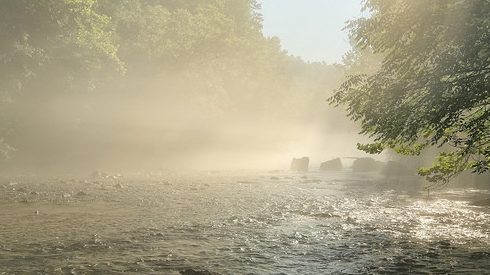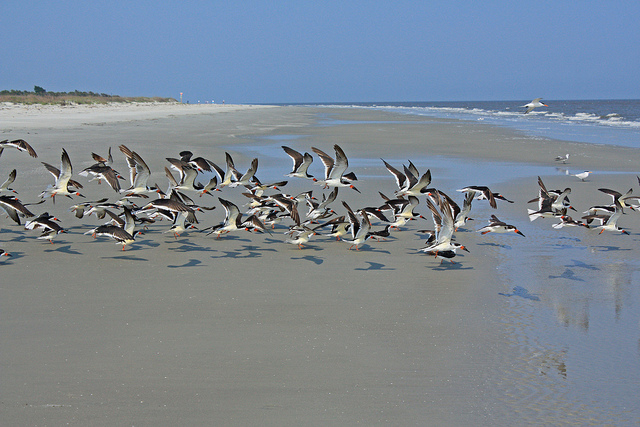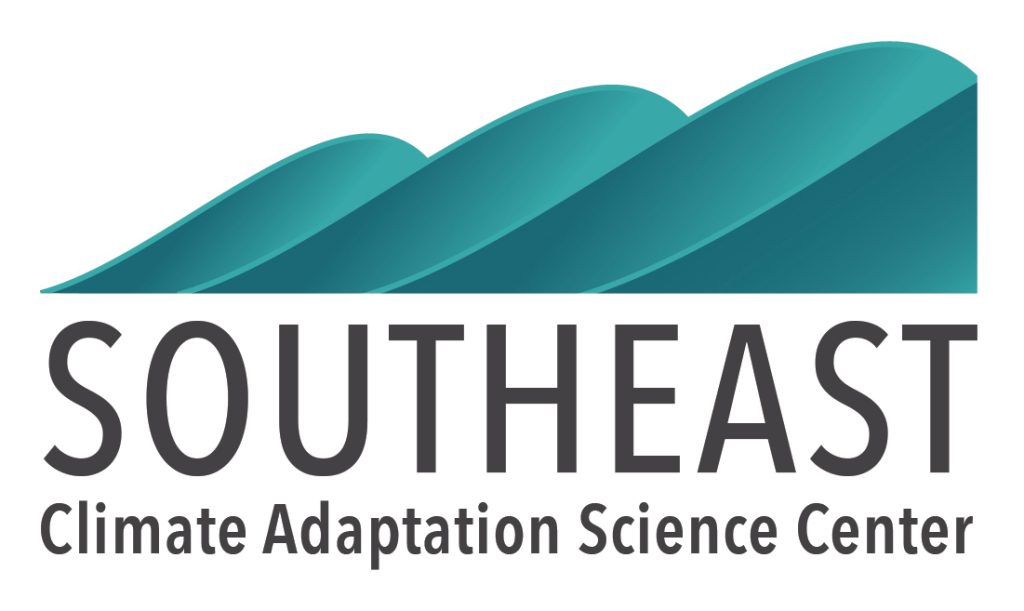April 2019 Newsletter

April 2019 Newsletter
Welcome to the Southeast Climate Adaptation Science Center’s April 2019 Newsletter
In this newsletter you will find:
SE CASC News
Resources
Notable Publications
Tribal News
Regional Partner News
Webinars
Upcoming Events
Opportunities
For news and upcoming events related to the Southeast Climate Adaptation Science Center, subscribe to our monthly newsletter.
[divider]

Southeast Climate Adaptation Science Center News
SAVE THE DATE for the Southeast CASC Regional Science Symposium, November 13 – 15, 2019, in New Orleans, LA. More details to come!
We are pleased to announce a new cohort of outstanding graduate students accepted as Global Change Fellows for 2019-20:
Sam Flake, Plant Biology
Faith Johnson, Civil, Construction and Environmental Engineering
Katherine Jones, Forestry and Environmental Resources/Center for Geospatial Analytics
Haofan Li, Civil, Construction and Environmental Engineering
Katie McQuillan, Forestry and Environmental Resources/Center for Geospatial Analytics
Ana Maria Meza Salazar, Applied Ecology
Lise Montefiore, Biological and Agricultural Engineering
Mario Simon Pinilla-Gallego, Applied Ecology
Emily Reed, Applied Ecology
Josh Schnitzlein, Design
Rachel Sussman, Marine, Earth and Atmospheric Sciences
Erin Voigt, Marine, Earth and Atmospheric Sciences
SE CASC Researchers and Staff are presenting at the 2019 National Adaptation Forum, April 23-25. Learn about our presentations and be sure to connect with us if you’re attending!
SE CASC Research Ecologist, Adam Terando, served as an expert panelist in a session on the fourth National Climate Assessment at the Gulf of Mexico Climate and Resilience Community of Practice, providing expertise on habitat impacts associated with climate change in the Southeast.
New web post: 2016-17 Global Change Fellow, Gabrielle Corradino, provides insights on her experience discussing research with Congressional staff. Read the post.
New Researcher Spotlight: Global Change Fellow, Emilee Briggs.
New publications by SE CASC Researchers, Fellows, and Affiliates:
SE CASC project, Protecting Cultural Resources in the Face of Climate Change, resulted in a recent publication by Erin Seekamp, Max Post van der Burg, Sandra Fatorić, Mitch Eaton, Xiao Xiao, and Allie McCreary, Optimizing historical preservation under climate change—An overview of the optimal preservation model and pilot testing at Cape Lookout National Seashore. Researchers worked with National Park Service and partners at Cape Lookout to identify cultural resource adaptation needs and to develop the Optimal Preservation Model, which enhances the ability of NPS managers to make more informed and transparent climate adaptation decisions for historic and cultural resources in parks, given various uncertainties and management constraints.
New publication by Erin Seekamp (SE CASC Researcher), Matt Jurjonas, and Karly Bitsura-Meszaros (2016-17 Global Change Fellow), Influences on coastal tourism demand and substitution behaviors from climate change impacts and hazard recovery responses, presents results of a discrete choice experiment designed to determine how physical and economic changes may affect visitation behaviors to the Outer Banks region of North Carolina, a coastal destination vulnerable to climate change.
2015-16 Global Change Fellow, Erica Henry and former University Director, Nick Haddad co-authored Do substitute species help or hinder endangered species management?
Faculty Affiliate, Jessica Whitehead is co-author on Evaluating Knowledge to Support Climate Action: A Framework for Sustained Assessment (see Featured Resource below).
Faculty Affiliate, Natalie Nelson was featured in Coastal Review Online article: Water Quality Researchers Highlight Studies.
Latest from Conservation Corridor: The prevalence and practice of connectivity in marine conservation planning.

Resources
FEATURED RESOURCE
Evaluating Knowledge to Support Climate Action: A Framework for Sustained Assessment
Report of an Independent Advisory Committee on Applied Climate Assessment
The process of navigating climate adaptation plans and increasing resiliency is filled with complex challenges. As states, cities, tribes, and private interests cope with climate damages and work to increase resiliency, they need access to authoritative climate information and support to evaluate and implement options for adaptation. An independent advisory committee that derived from a former Federal Advisory Committee developed a framework for practices that increase the role of state/local/tribal government and civil society in climate assessments. The expanded process would: (1) focus on applied problems faced by practitioners; (2) organize sustained partnerships for collaborative learning across similar projects and case studies to identify effective tested practices; and (3) assess and improve knowledge-based methods for project implementation. They make the following recommendations: Recommendation #1: Establish a civil-society-based climate assessment consortium; Recommendation #2: Assess knowledge in the context of how it is applied; Recommendation #3: Advance methods for climate risk management. Read the report.
Roads to Nowhere in Four States: State and Local Governments in the Atlantic Southeast Facing Sea-Level Rise. This report presents an analysis of four coastal southeastern states, Florida, Georgia, South Carolina, and North Carolina, all of which are currently facing challenges regarding how to protect property and infrastructure as sea levels rise and flooding increases. It presents three proposals for encouraging coordinated adaptation action and protecting local governments that take action to address climate impacts. View the report.
National Geodetic Survey. Provided by NOAA, this website holds data for all positioning activities in the United States, including but not limited to GPS, GNSS, remote sensing, land surveying, and geodesy data. Learn more.
Southeast Aquatic Barrier Prioritization Tool. This resource contains aquatic barrier datasets that can be explored in an interactive mapping program, allowing resource managers to spatially prioritize these barriers for removal and decrease aquatic habitat fragmentation. Learn more.
USA-NPN Pheno Forecasts.This visualization tool presents prediction maps for insect pests and invasive species which can inform for monitoring and management decisions in a particular region. Learn more.
In the Media
How Tribes Are Harnessing Cutting-Edge Data to Plan for Climate Change. Yes! Magazine
Parts of the southeastern US are naturally resilient to climate change—but not for long. Hatch Magazine
Climate change is already hurting fruit breeders, and consumers could soon feel the pain. Washington Post
Mosquito-borne diseases get a boost from climate change. Massive Science
Planning Tool Tracks Climate Change Effect on Infrastructure. Government Technology
Climate change means more floods, great and localized. ABC News
‘Meet the Press’ climate change episode shows a better way to cover the issue. Yale Climate Connections

Notable Publications
Differential Response of Greenhouse Gas Evasion to Storms in Forested and Wetland Streams. Greenhouse gas evasion is the transfer of gases such as carbon dioxide and methane from inland waters, most commonly in headwater streams, into the atmosphere and is a critical part of the global carbon cycle. The process has only recently been included in carbon cycle estimates, such as the IPCC Annual Report 5. Authors demonstrated variability in gas evasion by streams covering a gradient of wetland to forest land covers during rainstorms, determining that gas concentrations generally increased during storms in wetland streams, while concentrations tended to decrease or remain constant in forested streams. Link to article.
Informing Future Risks of Record‐Level Rainfall in the United States. The potential for increases in extreme precipitation is scientifically established, but pinpointing the exact changes and projection of extreme events is less known. The authors address the difficulty in projecting the risk of extreme precipitation by clustering the contiguous United States into self-similar hydroclimates and estimating changes in the expected frequency of extremely rare events under scenarios of global mean temperature change. They found that, although there is regional variation, record events are projected in general to become more intense, with 500‐year events intensifying by 10–50% under 2 °C of warming and by 40–100% under 4 °C of warming. Link to article.
Comparison of large‐scale citizen science data and long‐term study data for phenology modeling. With increasing support and large‐scale observational data from citizen science efforts in ecology, researchers now face a dilemma between choosing a large amount of less intensive data or fewer data from intensive local‐scale studies for their analyses. This study addresses the issue (spatial scale, observer variance, and interannual variability) with phenology by analyzing models built using data from the large‐scale, citizen science USA National Phenology Network (USA‐NPN) with models built using data from more intensive studies at Long Term Ecological Research (LTER) sites. They conclude that factors relying on the research question being assessed play a critical role in choosing between data sources for phenology modeling. Link to article.
Impacts of the North Atlantic Warming Hole in Future Climate Projections: Mean Atmospheric Circulation and the North Atlantic jet. The North Atlantic Warming Hole (NAWH) is a prominent region of reduced warming in the subpolar gyre of the North Atlantic ocean in future climate projections. This modeling experiment manipulated NAWH characteristics to estimate its impact on atmospheric circulation and midlatitude jets within the Community Earth System model. Two impacts were found to be important — a linear response and an enhanced eddy response — which varied based on season, time period, and warming hole strength. Link to article.
Climate change, woodpeckers, and forests: Current trends and future modeling needs. Climate-induced changes including variation in precipitation, temperature, fire, carbon mitigation strategies and biological disturbance are expected to have biodiversity implications for the structure and composition of forest ecosystems. The authors address a shortfall in the use of climate‐driven forest ecosystem models for predicting changes to biodiversity by proposed integrating woodpecker response (biodiversity indicator) with forest ecosystem models. Link to article.
Impacts of historical warming on marine fisheries production. This study expands on the reality that climate change has already altered habitats for marine fishes and invertebrates to estimate the effect of climate change on potential food production. Researchers used a mechanistic population dynamics model to measure the effects of ocean temperature on the productivity of 235 global fish and invertebrate populations of 124 species in 38 ecoregions, finding that 9 populations responded significantly positively and 19 responded significantly negatively to warming oceans. Important factors that explain response of marine populations were ecoregion, taxonomy, life history, and exploitation history. They recommend preventing overfishing and developing management strategies that are robust to temperature-driven changes in productivity. Link to article.

Tribal News
2019 Tribal Lands & Environment Forum. This year’s TLEF topics will include solid/hazardous waste management, brownfields, UST/LUSTs, Superfund sites, and emergency response. Additional information about water quality, drinking water, and habitat restoration (including wetlands, streams and fisheries) will also be included with breakout sessions, trainings and field trips. The event will be held at the Palm Springs Renaissance Hotel and Convention Center in Palm Springs, California on August 19-22, 2019. Learn more.
During the annual USET SPF Impact Week meeting in Washington, DC, the USET SPF Executive Officers discussed current issues impacting Indian Country and the 50th anniversary of USET. This panel was moderated by USET Executive Director, Kitcki Carroll, Citizen of the Cheyenne and Arapaho Tribes. Watch the panel discussion here.
Dibaginjigaadeg Anishinaabe Ezhitwaad: A Tribal Climate Adaptation Menu. This Adaptation Menu provides a framework to integrate indigenous and traditional knowledge, culture, language and history into the climate adaptation planning process. Learn more.
The Bureau of Indian Affairs has announced the availability of funding through the Tribal Resilience Program. This program will provide funding for tribal activities that support tribal resilience and/or and ocean and coastal management planning as tribes incorporate the science (including Traditional Knowledge) and technical information to prepare for extreme events and harmful environmental trends that impact tribal treaty and trust resources, economies, infrastructure, and human health and welfare. Solicitations for federally-recognized tribes are available here. Solicitations for not-for-profit, non-governmental tribal organizations and associations, and tribally-controlled colleges and universities (TCUs), referred to as “tribal organization(s)” are available on here. Tribal applications will receive priority. Proposals are due by June 10 by 9:00PM EST. More Information.

Regional Partner News
Tall Timbers: https://talltimbers.org/reintroduction-done-on-a-dime-may-work/
Southeast Aquatic Research Partnership: SARP Releases ESRI Story Map and Assessment Highlighting Aquatic Conservation in the ACF River Basin
SERPASS: Developing the Good Map for the Southeast Regional Partnership for Planning and Sustainability
Southeast Conservation Adaptation Strategy: SECAS governance – Refining an organizational model to sustain collaborative conservation in the Southeast

Webinars
Find more webinar information in our calendar.
Apr 23 | 12PM – 1PM | Indigenous Practices Contribute to Carbon Management and Climate Adaptation
Apr 24 | 2PM – 3PM | Accessing the Coastal Carbon Atlas: A new blue carbon data clearinghouse tool
Apr 30 | 12PM – 1PM | Global carbon budget accounting following the State of the Carbon Cycle Report: The Regional Carbon Cycle Assessment and Processes study
May 1 | 12PM – 1PM | Mapping Climate Change Refugia for Vernal Pools
May 1 | 1PM – 2PM | 2018 AFWA Climate Adaptation Survey Results
View the One NOAA Science Seminar Series webinar schedule here.

Upcoming Events
Find more upcoming events in our calendar.
May 29-30 | Building Resilience to a Changing Climate: A Technical Training in Water Utility Decision Support | Clearwater, FL
May 29-30 | Training Opportunity: Adaptation Planning for Coastal Communities | Conway, SC
June 17-20 | Planning for a Changing Climate | Shepherdstown, WV
June 18-20 | Southeast Coastal Ocean Observing Regional Association (SECOORA) 2019 Annual Meeting | Wilmington, NC
Oct 17-19 | RALLY 2019 • National Land Conservation Conference | Raleigh, NC
Nov 19-23 | The Association for Preservation Technology International (APT) Conference | Miami, FL
At NC State
Apr 25 | Neuromodulators and timing precision in the songbird auditory cortex | 101 David Clark Labs

Opportunities
Student Announcements
University Corporation for Atmospheric Research is looking for three graduate students from underrepresented communities for their Next Generation Fellowships in Earth System Science, Diversity and Inclusion, and Public Policy. The award is for two school years and two summer internships, fellows will receive $20,000 per school year, plus support during the summer internships. The deadline to apply is June 3. More information..
Hiring Announcements
The South Central Climate Adaptation Science Center is looking for a New Mexico Tribal Liaison. This position manages relationships between the South Central Climate Adaptation Science Center (CASC) and its Tribal partners in New Mexico and will be based out of the University of New Mexico in Albuquerque as an employee of the University of Oklahoma. The liaison will be responsible for working closely with partners from a variety of Tribes, Pueblos, and inter-tribal organizations in New Mexico to develop and deliver trainings on climate adaptation and related topics, provide support to communities seeking or engaged in adaptation activities, and work to identify and reduce barriers to implementing Tribal adaptation activities. Apply here.
Carolinas Integrated Sciences & Assessments (CISA), one of eleven NOAA-funded Regional Integrated Sciences and Assessments, is accepting applications to fill the position of Climate-Health Integration and Outreach Specialist. The position is based at the University of North Carolina in Chapel Hill. The specialist will work closely with CISA and the Southeast Regional Climate Center to conduct research and engagement activities to address the impacts of climate on public health in the Carolinas. Information about the position and application instructions.
Research Grants
The Network for Landscape Conservation has announced a request for proposals for the new Landscape Conservation Catalyst Fund. NLC is offering up to $335,000 in funding through competitive grants in 2019. Applicants may request a one- or two-year grant of $10,000 – $25,000.The purpose of the Landscape Conservation Catalyst Fund is to accelerate the pace and effective practice of place-based, collaborative landscape conservation across the United States. Pre-proposals are due by April 26. More information.
- Categories:

